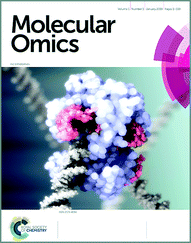Introducing Molecular Omics
Welcome to issue 1 2018 of Molecular Omics!Molecular Omics is the new name for Molecular BioSystems (MBS). We are starting 2018 with a new name, a new subject focus and a renewed emphasis on publishing some of the most interesting and potentially impactful research and reviews in omics science.
A re-focussed scope
We now focus on molecular level research in the omics sciences, one of the three major topics that had been covered in Molecular BioSystems. From long-established areas of research such as genomics and proteomics to fast growing topics like transcriptomics, glycomics and metabolomics, we will be publishing some of the most intriguing research in these fields. We also welcome multidisciplinary papers presenting studies combining different types of omics, or at the interface of omics and other fields such as systems biology or chemical biology. Our new title, Molecular Omics, reflects this re-focussed scope.A journal for high impact research
We know that researchers are incredibly busy and have time to keep up with only a fraction of the research in their field. That is why we’re aiming for the journal to publish only significant and interesting new results, and stimulating, easy to read reviews, with a goal of it becoming essential reading for those working in the field.Molecular Omics only publishes articles that are of significant importance to their field; either fundamental research which significantly increases understanding, or research which demonstrates clear functional benefits. The title of the journal is meaningful. We are looking for omics technologies applied to biological problems that generate molecular insights. The exception to this will be compelling new methods in omics technologies, especially those that integrate multiple omics technologies.
A publisher you can trust
We aim to offer all our authors great service. Our publishing staff – all scientists – and our Associate Editor Mike Washburn will guide authors through the peer review and publication process, offering fair and fast peer review. There are no submission, publication or colour charges for standard publication, and open access options are available.As a journal of the Royal Society of Chemistry, a publisher of over 40 journals including many at the interface of chemistry and other disciplines, Molecular Omics will have a global reach. Also, as a Society Publisher, we re-invest all surplus back into the global scientific community, providing ongoing support for authors, researchers, and educators in every field of chemistry and related disciplines.
Introducing our Editorial Board Chair
We are very pleased to welcome Professor Robert Moritz from the Institute of Systems Biology in the US as Chair of the Molecular Omics Editorial Board. Robert joins our Associate Editor Mike Washburn and our other Board members in shaping the strategy, scope and standards of the journal.Featured in this issue
Amongst the articles in this issue, Martin Golkowski, Dustin J. Maly and Shao-En Ong from University of Washington report the kinome chemoproteomics characterization of potential inhibitors of GSK3, a kinase thought to be involved in several neurological diseases (DOI: 10.1039/C7MO00006E). JiaRui Li, Tao Huang and Yu-Dong Cai at Shanghai University use fast and accurate SMOTE, dagging, and feature selection methods to identify cleavage sites in signal peptides based on protein sequences (DOI: 10.1039/C7MO00030H). Meanwhile in their review Ilias Tagkopoulos and Minseung Kim at University of California, Davis, discuss the opportunities and challenges in multi-omics predictive analytics (DOI: 10.1039/C7MO00051K).I hope you enjoy reading this issue.
Dr Richard Kelly
Executive Editor, Molecular Omics
| This journal is © The Royal Society of Chemistry 2018 |

